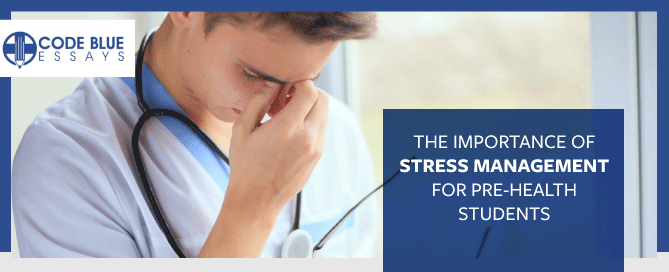The Importance of Stress Management for Pre-Health Students
0 Comments

August 24, 2021 in Admissions, Just for Fun, Medical School Tips, Personal Statement Tips, Study skills
As summer comes to a close and the school year is near, it’s more important than ever for pre-health students to balance productivity with the opportunity to recharge.
The busy lifestyle of Pre-health students
As a pre-health student, you have a to-do list a mile long, and that can feel overwhelming. The constant studying to get the grades and score well on the admissions tests can wear on you. Meanwhile, you’re trying to rack up extracurriculars to boost your resume and secure great letters of recommendation, and that can take up what seems like all your free time. Finally, there’s the application process, which can feel confusing and overwhelming with all of the documents to gather and essays to write and edit. It can be isolating and might seem like everything falls on you to get done. At Code Blue, we know this feeling very well and have helped students just like you make it through the application process with our personal statement writing course and essay editing services. No matter what, know that you are not alone and that there is help around you if you just look for it.
What are some other ways you can deal with stress as a Pre-health student?
Compare less
AAMC advises that the summer is a great time for pre-med students “to unwind and begin to practice healthy habits.” One suggestion AAMC offers as a healthy habit is to cut back on comparing yourself to your peers. By nature, getting into a graduate school in health is competitive, so the comparison is natural! It’s really easy to get caught up in what those around you are doing and achieving, especially in the age of social media.
AAMC says that “comparing your grades, scores, and activities to others can be toxic.” They suggest that using these as metrics for success is tantamount to checking a box. In other words, they don’t matter as much as you think they do. Remember, you want to be a unique candidate for your health graduate program, and there’s not a cookie-cutter for that! Focus on what you have passion for, especially if it’s not something your peer is focused on. Your college experience is unique, which means you are beyond comparison.
Something also important to remember is that what your peers put forward on social media is always the best possible version of themselves – nobody posts difficulties or imperfections! Embrace that fact the next time you fall into the comparison trap.
Talk about it or write it down
Another suggestion from AAMC is to talk about your stress with friends, family, or other influential people in your life. Support is critical! Psychology Today notes that “studies have shown that simply talking about our problems and sharing our negative emotions with someone we trust can be profoundly healing – reducing stress, strengthening our immune system…” Both AAMC and Psychology Today also note the helpfulness of writing down what is stressing us. Writing our stressors down acts as a release mechanism, allowing you to let go of the stress.
Find a physical activity you love
According to the Anxiety & Depression Association of America, “exercise and other physical activity produce endorphins—chemicals in the brain that act as natural painkillers—and also improve the ability to sleep, which in turn reduces stress.” The AAMC suggests not only engaging in physical activity but finding a physical activity that you love to relieve stress.
The “that you love” part of this tip is the game-changer. If you are not currently very physically active, asking you to begin to engage in physical activity probably doesn’t sound that great. In fact, it may even feel… stressful to add one more thing to your list of to-dos. However, if you find a physical activity you are excited to engage in, it feels completely different.
Physical activity could be any activity inside a gym, but exciting activities like hiking or rock climbing also fit the bill. You could also make it a social thing by finding an exercise buddy you enjoy being around.
Practice a deep breathing exercise
A Harvard Medical School post filed under “Staying Healthy” suggests that deep breathing exercises aid in alleviating stress. The practice can seem awkward and unnatural. Interestingly, deep breathing is uncommon because of body image: deep breathing expands the lower abdomen, which feels unattractive because society favors a flat stomach. Shallow chest breathing is much more common but doesn’t offer the same maximum oxygen exchange that deep breathing does, resulting in anxiety and shortness of breath.
HMS gives step-by-step instructions for engaging in deep breathing. First, one must breathe “slowly and deeply,” pushing the abdomen out, putting the diaphragm “to maximal use.” Then, one should briefly hold the breath in. Next, instructions are to “exhale slowly, thinking ‘relax.’” Finally, the pattern repeats 5-10 times, focused on the slow and deep breath. Deep breathing is said to alleviate immediate stress, and also helps with stress long-term.
There are many options for living healthier to reduce stress in your life, including many not listed above. Ultimately, the important thing is that you figure out what works for you, and you always know there is somewhere to turn for help. Remember Code Blue when you’re stressing about your health graduate school applications. We are here to help relieve some of that stress!